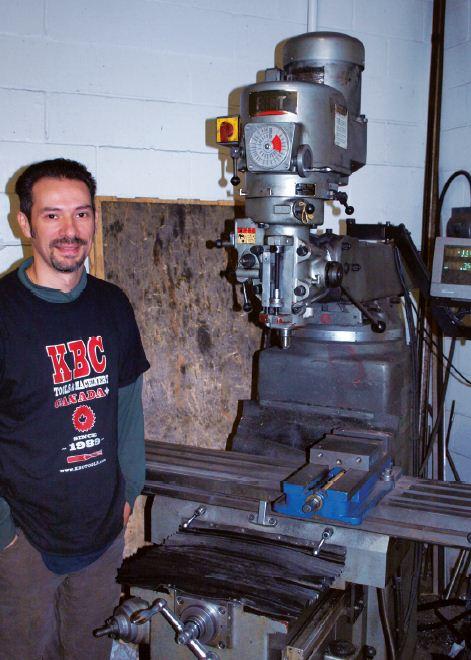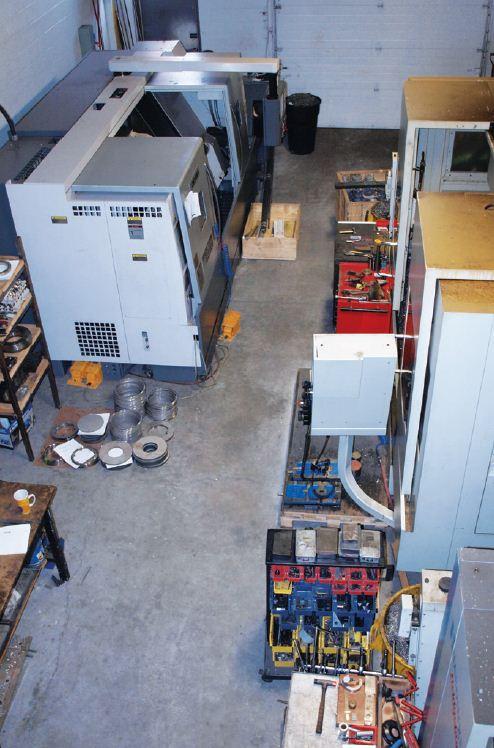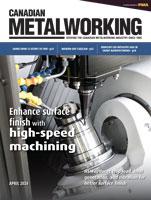- FMA
- The Fabricator
- FABTECH
- Canadian Metalworking
Business Profile: D&D Precision
Building on the strength of its owners.
- By Canadian Metalworking
- February 17, 2015
- Article
- Metalworking
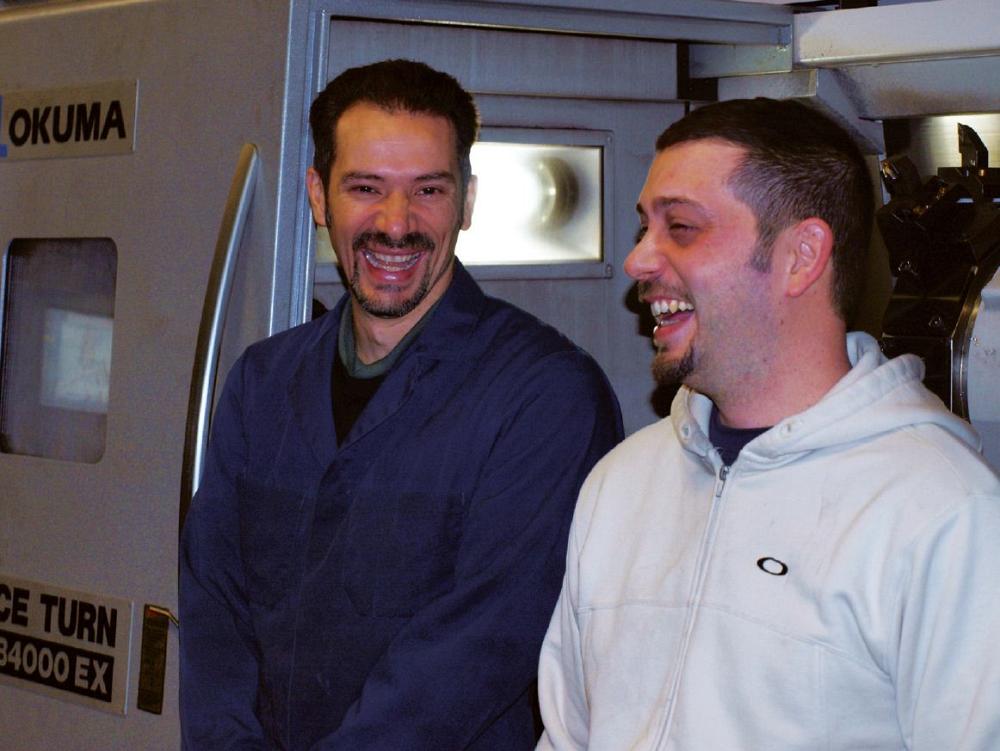
“We take our work very seriously, but we have fun.” The partners of D&D Precision, Tony Desousa (left) and Mike De Acetis with the company’s new Okuma LB4000 EX two-axis lathe.
It’s Friday afternoon, just a week before Christmas, and the two owners of D&D Precision, a small machining shop in Mississauga, are preparing to go make some visits—dropping in on their loyal customers to share some holiday cheer and express their appreciation for another year of living the dream.
Located in a small industrial park minutes from Toronto’s Pearson airport, D&D Precision’s narrow 2,000 sq. ft. unit has a small office space in front and the back is a long corridor lined on both sides with machines and tools of the trade. Tony Desousa and Mike De Acetis, the D & D, started their business eight years ago and have worked together to build a successful operation by continuing to invest and grow the business while adapting to the fast-changing manufacturing industry.
Both from the Greater Toronto area, Desousa and De Acetis met while working as mold makers for Ryka Blow Molds, a shop that was located around the corner from where they are now. De Acetis was running machines and managing a testing facility, while Desousa, after finishing his apprenticeship on the shop floor, took on more business and administrative roles in the office.
The two often worked together and were frequently mistaken as brothers. Sensing a strong compatibility, their conversations led to talk about starting up a business.
“Thank you Michael Ryan (original founder of Ryka Blow Molds) for the tools and knowledge we acquired at Ryka,” says Desousa.
Through a family friend of De Acetis, the two were able to secure a walled-in 10- x 10-foot space on the floor of a plastics factory, squeezing in a small lathe and a manual milling machine.
At the beginning both were still employed. They would often work a full shift and race to the other shop staying up until the middle of the night, only to get up and do it all over again.
A little more than a year into the project they took the leap, leaving their well-paying jobs to break out on their own. “We took a big chance. Everyone told us we were crazy, and we’re still getting that today,” laughs De Acetis. “The thing is, both Tony and I, we love what we do.”
It was 2006 when D&D Precision was born, and two years after the launch came the economic crash in 2008. “It’s like somebody turned the taps off,” recalls De Acetis.
The partners went four months without drawing a salary, yet at the tail end of 2008 they went out and bought a small used CNC lathe. As De Acetis remembers, the machine sat silent on their floor for the first month, but it’s been going non-stop ever since.
“Taking chances and not being afraid, that’s part of business,” says De Acetis. And it’s been their strategic moves that have kept them rolling. “Machine shops have got to be smarter, leaner, and faster,” he says, insisting that business owners need to keep up with the changing times.
“It’ not a guarantee that you will be successful by just adding new equipment. For us, I believe it’s been the combination of our skill sets. Tony sells it, and I make it run.”
Their space on that factory floor grew to 800 sq. ft., but as jobs began piling up they became restricted by their technology—material had to wait for a spindle to free up. They were in need of another, larger, mill and ultimately found a used machine at a local aerospace company. “It was a perfect fit for us, and that’s what led to the move to our current facility [in April 2013],” explains Desousa. The larger envelope of the new mill led to a greater range of work possibilities, and soon the business was growing again. Now work began piling up on their lathe, which led to researching new turning machines. And based on their history they knew they were better off going with something bigger.
“We always overkill our homework, and it’s helped us along the way,” says De Acetis. They ended up going with a new Okuma LB4000 EX two-axis lathe with live tooling. “It was a calculated move and we have no regrets,” he says.
Purchased from EMEC Machine Tools in Mississauga, the new machine has a maximum machining diameter of 18.9 inches and length of 60 inches between centers. The live tooling option also allows them to perform a combination of processes from one set up.
“I’m surprised at how easy it was to program and dive into operating the machine,” says De Acetis. “And EMEC has been phenomenal. It’s the first product we’ve bought from them and likely not the last, considering the way they’ve treated us.”
D&D has been taking on jobs from a variety of industries: aerospace, material handling, freight elevators and military. “Anything that can fit on our equipment we can do, and we don’t shy away from tolerancing since our machines are capable of holding accuracy and repeatability,” says Desousa. “I would classify us as a medium-sized shop now. But we have that big shop capability.”
The partners are hoping to position the company correctly over the next five to 10 years, and as experienced machinists they are optimistic that the machining industry will climb its way back to the place it belongs “at the top of the trades”.
“If all goes well, we will be right there,” says Desousa.
The Okuma was installed in the summer of 2014 and it’s been running non-stop. The challenge now for D&D is keeping up with the business and managing their workflow.
They try to maximize machine time with intelligent set ups, but they are actively seeking additional hands to work the machines—and that’s proving to be difficult.
In busy periods they have hired operators on a contract basis, but the challenge has been finding someone reliable and passionate about the work.
De Acetis is 40, and he’s concerned about lack of next generation machinists coming up after him. “When I started there were people eagerly interested in pursuing a career in this field. I don’t see that now,” he says.
Both partners see the problem coming with this skills gap in the workforce. In fact, until now they haven’t been actively promoting their new capabilities, hoping to find a couple more people to alleviate the workload before they start pushing for more work.
“The business is heading in the right direction, that’s for sure. But we still have to watch what we spend and be selective on the type of business that we choose, because now we’ve got the range, but you can still bury yourself by selecting the wrong type of work,” says De Acetis.
In 2015 it’s about optimizing their workflow through the shop, making sure the work they’re doing is profitable.
One aspect of the industry today that Desousa finds challenging are the short lead times (lean manufacturing), or just in time delivery and lack of long term project commitments.
“We’re lucky though, from day one our customers have been awesome,” admits De Acetis. “Of course without them none of this would be possible. They have had the confidence and faith in us and have stuck with us.”
But Desousa and De Acetis are not shy to give themselves credit as well. They put Precision in their name for a reason. “You have to hold yourself to a standard, anyone who doesn’t won’t be around for long,” says De Acetis.
With the business running smoothly, the partners are content, but they do have goals, including the possibility of one day designing, developing and producing products of their own—they already have ideas and concepts in the works.
“To me that is an ultimate goal,” says Desousa. “At that point you become global. You go from having 10 customers to 10 million potential customers.” For now though, the owners of D&D
Precision are happy to keep their machines humming, enjoying work and life. “We’ve always said, it’s a tough business, but let’s have fun. We take our work very seriously, but awe have fun,” laughs De Acetis.
About the Author
subscribe now


Keep up to date with the latest news, events, and technology for all things metal from our pair of monthly magazines written specifically for Canadian manufacturers!
Start Your Free Subscription- Trending Articles
Automating additive manufacturing
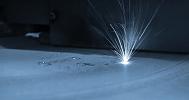
Sustainability Analyzer Tool helps users measure and reduce carbon footprint

CTMA launches another round of Career-Ready program

Sandvik Coromant hosts workforce development event empowering young women in manufacturing

GF Machining Solutions names managing director and head of market region North and Central Americas

- Industry Events
MME Winnipeg
- April 30, 2024
- Winnipeg, ON Canada
CTMA Economic Uncertainty: Helping You Navigate Windsor Seminar
- April 30, 2024
- Windsor, ON Canada
CTMA Economic Uncertainty: Helping You Navigate Kitchener Seminar
- May 2, 2024
- Kitchener, ON Canada
Automate 2024
- May 6 - 9, 2024
- Chicago, IL
ANCA Open House
- May 7 - 8, 2024
- Wixom, MI













